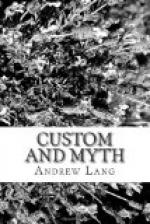As to the ancient Romans, Plutarch says: Formerly they did not marry women connected with them by blood, any more than they now marry aunts or sisters. It was long before they would even intermarry with cousins.’ Plutarch also remarks that, in times past, Romans did not marry [Greek], and if we may render this ‘women of the same gens,’ the exogamous prohibition in Rome was as complete as among the Hindoos. I do not quite gather from Sir Henry Maine’s account of the Slavonic house communities (pp. 254, 255) whether they dislike all kindred marriages, or only marriage within the ’greater blood’—that is, within the kinship on the male side. He says: ’The South Slavonians bring their wives into the group, in which they are socially organised, from a considerable distance outside. . . . Every marriage which requires an ecclesiastical dispensation is regarded as disreputable.’
On the whole, wide prohibitions of marriage are archaic: the widest are savage; the narrowest are modern and civilised. Thus the Hindoo prohibition is old, barbarous, and wide. ‘The barbarous Aryan,’ says Sir Henry Maine, ’is generally exogamous. He has a most extensive table of prohibited degrees.’ Thus exogamy seems to be a survival of barbarism. The question for us is, Can we call exogamy a survival from a period when (owing to scarcity of women and polyandry) clear ideas of kinship were impossible? If this can be proved, exogamous Aryans either passed through polyandrous institutions, or borrowed a savage custom derived from a period when ideas of kinship were obscure.
If we only knew the origin of the prohibition to marry within the family name all would be plain sailing. At present several theories of the origin of exogamy are before the world. Mr. Morgan, the author of ‘Ancient Society,’ inclines to trace the prohibition to a great early physiological discovery, acted on by primitive men by virtue of a contrat social. Early man discovered that children of unsound constitutions were born of nearly related parents. Mr. Morgan says: ’Primitive men very early discovered the evils of close interbreeding.’ Elsewhere Mr. Morgan writes: ’Intermarriage in the gens was prohibited, to secure the benefits of marrying out with unrelated persons.’ This arrangement was ’a product of high intelligence,’ and Mr. Morgan calls it a ‘reform.’
Let us examine this very curious theory. First: Mr. Morgan supposes early man to have made a discovery (the evils of the marriage of near kin) which evades modern physiological science. Modern science has not determined that the marriages of kinsfolk are pernicious. Is it credible that savages should discover a fact which puzzles science? It may be replied that modern care, nursing, and medical art save children of near marriages from results which were pernicious to the children of early man. Secondly: Mr. Morgan supposes that barbarous man (so notoriously reckless of the morrow as he is),




